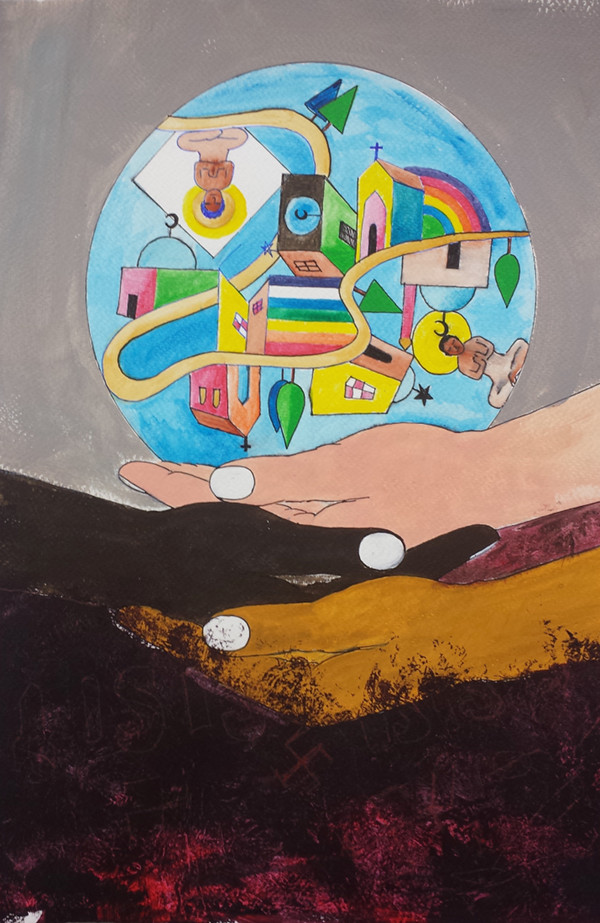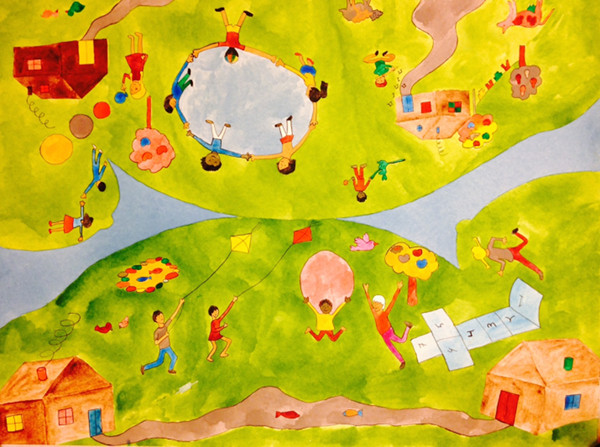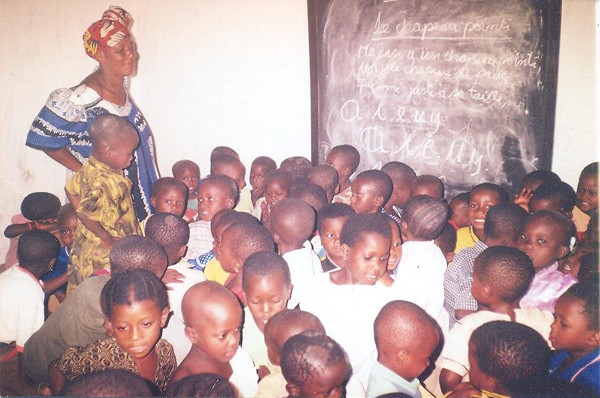|
|
|
|
Nonkilling Arts Research Committee Letter: Vol. 5, N. 2 (March-April 2021)
|
|
|
|
|
Dear NKARC members and friends,
The January-February period marked the anniversaries of three important nonviolent luminaries: Dr. Martin Luther King Jr., Mahatma Gandhi, and Professor Glenn D. Paige. We salute these peace champions with your tributes of poetry, fiction, visual art, song, architecture, reflections and journalism. Your works point to ever strong human will to challenge social inequities, pandemics, wars, nuclear holocaust, and climate crisis etc.
|
|
|
|
1. Nonkilling Poetry
The three poems below by NKARC colleagues from Switzerland, Canada and Brazil challenge us to reflect on ‘Life to be Peace’, ‘Vaccine as a possible Hope’, and ‘Vaccines as a life sustaining medication’.
|
LIFE IS PEACE
Peace is a deep ocean,
We swim it with delight,
In full harmony with nature,
As with our human nature…
|
Sometimes we come to the shores,
And without doubt or reprieve
We overflow the world
- And all its people ! -
With the vastness
Of the human plan,
Sustained !
|
We see life all around us,
We are life within life!
This overflow is so wide,
So deep and so intense,
That only joy can overpass …
The very meaning of life!
|
Joy, bringing us back
To our heartfelt motion,
From where,
Swimming in silence
We overflow,
Evermore …
Living our lives
Lifefully and …
Peacefully !
Life is peace.
— Christophe Barbey, Editions Pour de Vrai. Geneva, Switzerland
|
|
LOOKING BACK TO LOOK AHEAD
Before spring could arrive
An unannounced visitor
Who did not even knock
Breaking down our doors
It was the dreaded virus
That crossed the Great Wall
Some took it seriously
But others were nonchalant
Helping the virus
To enter
Every nook and corner
Of our lives
And the year after Twenty Nineteen
Became the year of Covid-Nineteen
Like the relentless
Waves of the ocean
The virus kept on pounding our shores
With no relief in sight
We were at the mercy of the virus
And the saintliness
Of our front-line workers
Toiling selflessly
To take care
And to discover
A vaccine at last
Spreading cautious hope
For Twenty Twenty-one
Since the battle
Is yet to be won
— Jayanta Guha, Mosaïque, Saguenay, Quebec, Canada
|
ON VACCINES
Vaccines
Prevention
Vaccines
Intervention
Vaccines
Scientific invention
Vaccines
Government attention
Vaccines
Global cooperation
Vaccines
Public health operation
Vaccines
Global health amelioration
Vaccines
A life- sustaining medication
For building a nonkilling civilization
— Francisco Gomes de Matos, ABA Global Education, Recife, Brazil
|
|
|
|
2. Nonkilling Fiction
|
The novella Ghachar Ghochar by Vivek Shanbhag was recommended as an outstanding feminist nonkilling fiction in English from India. A smartly written book about gender violence, it is a story of a middle class family in the city of Bangalore that sees change in its fortune and relationships of its family members. The only violent act that takes place in the story is that of killing an ant. On the surface, it’s a matter of fact piece half in jest half in earnest. Deftly crafted, it leaves a reader with a deep sense of unease. As the narrator concludes: "I freeze. What is happening? What have I become entangled in? There must be some way out of all this. The words rush into my head of their own accord: ghachar, ghochar." The Wikipedia page on this work cites New Statesman critic Preeti Taneja describe it as the heartbreaking achievement of the author’s writing: "a body and mind coming of age in a society that casts violence as tenderness, ownership as love." (accessed on 08/01/2021)
|
(Vivek Shanbhag (2013), Ghachar Ghochar, New York: Penguin Books, pp.119)
|
|
|
|
3. Nonkilling Music Research
Creating Music video for Nonkilling education, research, practice and networking:
The “FAR AWAY” Music Video of the popular song composed by youth from Japan and Northern Ireland is presented by NKARC colleague Olivier Urbain, director of the Min-On Music Research Institute, co-producer of the video with Darren Ferguson, CEO of the NGO Beyond Skin. He asks whether this song can be the topic of teaching, research and discussions regarding the promotion of a nonkilling world.
|
{ Watch the song "FAR AWAY" (10,000+ views on the Japanese channel, and 3,750+ on this channel, total 13,750+!) }
|
The project evolved from following three concerns in Japan and Northern Ireland communities:
|
- The youth in Japan have overcome bullying, school refusal and exclusion from society, developing the emotional/social skills they needed to become whole again.
- The youth in Northern Ireland have succeeded in expressing the tremendous suffering caused by the pandemic, not letting the lockdowns and confusion stop them.
- This video provides an example of artistic collaboration across cultures, at a time when divisions, nationalism and fear of differences are increasing worldwide.
To find out more, there is a 25 min documentary on the struggles and victories of the Japanese students. A video about the students in Northern Ireland is planned for this year.
|
|
|
|
4. Nonkilling Song
Quebec musical group Mosaïque, founded in 1993, brought to stage the French version of the poem “I want an answer”, entitled “Qui pourra me dire” with excerpts in English as well a bit of Bengali by the group. It was performed in Jonquière-Saguenay in 2016, along with Surojit Chatterjee, a composer and song writer of Bengal, who has been collaborating with the group since 2006. Thank you, Jayanta.
|
|
|
|
5. Nonkilling Art
|
Two evocative untitled paintings from Amelia Burke, Fabricants de Futur collectif by two Afghan artists, Sakhi Rajabi and Kubra Khademi, both from Kabul, living as refugees in France now. The theme of their works is about One World but how we each see it differently. The one by Rajabi is a powerful plea for unity in lifting the globe from a cesspool of hatred, poverty, war and environmental degradation. It’s only through working together we will protect it. Kubra's painting is about games she played as a child, and the 'world' the children are playing in is the form of two pregnant women. The bumps of the breasts and belly form the hills and valleys.
|
|

|

|
|
|
6. Nonkilling Architecture
The Aga Khan Award for Architecture and Design: The AK Award established in 1977, is one of the prestigious awards of its kind. It plays an important role in influencing global architectural discourse and promoting innovative solutions to societal issues. The 2019 awards that are given every three years, were recently announced. The winning designs aims at addressing the contemporary concerns of sustainability, human scale, climate adaptation, and quality of life. The following link connects to the winning designs and their dynamic young designers.
|
|
|
|
7. Nonkilling Ode
|
Inspirations over the past decade from young women of courage and conscience have kept on originating from different parts of the globe: Malala Yousafzai (UK/Pakistan) , Greta Thunberg (Norway), and now Amanda Gorman (USA).
|
Gorman wrote the poem, titled "The Hill We Climb," the night after pro-Donald Trump rioters attacked the Capitol building in Washington, USA on January 6. She was invited as US Youth poet laureate to recite her poem at the Inauguration of new US President Joe Biden and Vice President Kamala Harris. In prelude to the poem, she said: “what I really aspire to do in the poem is to be able to use my words to envision a way in which our country can still come together and can still heal...” See below an excerpt, followed by a 7 min video of her recitation at the Capitol.
|
by Amanda Gorman
Scripture tells us to envision
that everyone shall sit under their own vine and fig tree
and no one shall make them afraid.
If we're to live up to our own time,
then victory won't lie in the blade.
But in all the bridges we've made,
that is the promise to glade,
the hill we climb...
|
|
|
|
8. CGNK Project
Glenn Paige Nonkilling School, Kazimia, Democratic Republic of Congo:
NKARC colleague Lucien Mabwe a decade ago took this path-breaking initiative in introducing the Nonkilling paradigm in the Great Lake Region of Africa - in Burundi, D.R. Congo and Rwanda. It started in 2005-06 in Baraka, Bibokoboko, and Bujumbara with his organization of Reconciliation workshops, Nonkilling leadership training programs and Public seminars. Monsieur Mabwe had come to know of Prof. Paige’s book Nonkilling Global Political Science (NKGPS) on internet. The book inspired him to develop a detailed conflict transformation program with his local colleagues, leading to NKGPS translated into local Kiswahili language (Ujenzi wa Jamii Isiyokuwa na Mauaji) and printing of its 5000 copies and its distribution in 20 towns, cities and villages of three regions. This also involved his Mleci team to establish Glenn D. Paige Nonkilling School in Kazimia-Katondje, Fizi (South-Kivu Province, DR Congo), and a Center for Global Nonkilling Affiliate in Great Lake Region of Africa. A great deal of support for the building of Glenn D. Paige Nonkiiling School over past nine years school in addition to local self-help has come through donations of Global Giving Foundation, Mennonite Margaret Ebby’s family, and individual donors to see this pioneering school built brick by brick.
|
|

|
|
The kindergarten and primary school at Kazimia-Katondje, Fizi (South-Kivu Province, DR Congo) started in 2006 was renamed «Glenn Paige Nonkilling School» by its founders to honour Professor Paige in July 2009 for inspiration and support. The school provides education to over 200 students, mostly casualties of war, disease and abandonment. Besides providing free education to the local community, the school also offers breakfast, health care and clothing. Ultimately, the goal is to make over 6000 vulnerable children become a source for nonkilling leadership in the Great Lake Region.
|
Salut Monsiur Mabwe and team for pioneering Africa Nonkilling work!
|
|
|
|
9. Nonkilling Research/Reflections
|
(1) Revolution and Non-Violence in Tolstoy, Gandhi, and Mandela by Imraan Coovadia (Oxford University Press, 2020): Review by Kalim Rajab
|
|
In his insightful review Kalim Rajab writes: “Coovadia, the South African writer and professor of English at the University of Cape Town, is also an imaginative essayist and here he casts his eye over an awkward juxtaposition he has noticed in the lives of three great and radical figures of twentieth century humanism and peace as they sought to bring about social change – a juxtaposition of violence co-existing with non-violent techniques, each manifesting itself in close proximity to the other within the lives and experiences of Leo Tolstoy, Mahatma Gandhi and Nelson Mandela... He seeks to unravel the closeness between the practices of violence and non-violence – in how each is organised and maintained, and the discipline each needs to renew its strength... Would passive resistance have been as powerful, say, if the opponent had been fascism rather than British imperialism?”
|
(2) “Machiavelli or Gandhi? Chaiwat Satha-Anand’s Nonviolence in a Comparative Perspective” by Carool Kersten.
Kersten in this review paper examines the doctrine of non-violence by prolific political philosopher and Thai activist Chaiwat Satha-Anand. His theoretical considerations are contrasted with the Gandhian notion of non-violence through a comparison with neo-conservative political philosopher Leo Strauss. Kersten writes: “Since political violence is one of the most acute problems that need to be resolved, and since most violence is perpetrated by rulers, the most effective way to introduce nonviolence is by addressing political leaders. This gave Chaiwat the idea of devising a radical rewriting of Machiavelli’s seminal work The Prince. Because of his advocacy of a pragmatic approach, and bearing in mind that a mere appeal to “love” would not likely change the mind of the opponent, Chaiwat argues that instead the ruler must be provided with alternatives that match violent ones in efficacy, efficiency and availability of resources."
|
(3) War is not part of human nature by R. Brian Ferguson
NKARC colleague anthropologist Leslie Sponsel has widely written on the topic, here is an interesting summation of two views on the subject of war is part or not part of human nature. Anthropologist Ferguson writes: "Do people, or perhaps just males, have an evolved predisposition to kill members of other groups? Not just a capacity to kill but an innate propensity to take up arms, tilting us toward collective violence? The word “collective” is key. People fight and kill for personal reasons, but homicide is not war. War is social, with groups organized to kill people from other groups. Today controversy over the historical roots of warfare revolves around two polar positions. In one, war is an evolved propensity to eliminate any potential competitors. In this scenario, humans all the way back to our common ancestors with chimpanzees have always made war. The other position holds that armed conflict has only emerged over recent millennia, as changing social conditions provided the motivation and organization to collectively kill. The two sides separate into what the late anthropologist Keith Otterbein called hawks and doves...”
|
|
|
|
10. Nonkilling Journalism
|
|
|
Last Word
WELCOME 2021
May our Spirituality be broadened
May our Health be strengthened
May our solidarity be humbling
May our global equality be dignifying
May our global communication
be ever peacebuilding
May Humanity be given scientific sapience
-- Francisco Gomes de Matos. A peace linguist, Recife Brazil
|
|
|
|
My deep gratitude to all who contributed and pointed to the material for the Letter.
I look forward as always to your inspirations, suggestions and comments.
|
|
"Nonkilling Culture crosses all the lines." —Glenn D. Paige
|
Nonkilling is THE measure of Human progress
|
[THIS IS AN INTERNAL NEWSLETTER OF THE NKARC. COPYRIGHT FOR ALL MATERIAL IN THE NEWSLETTER REMAINS PROPERTY OF THE SOURCES/WRITERS/ART CREATORS]
|
|
|
|
Stay in contact also on Social Networks
- Please feel free to contact NKARC Letter's coordinator at billbhaneja@nonkilling.org.
- You can also follow the Center for Global Nonkilling at these social networks:
|
 
|
|
|
|
|
|